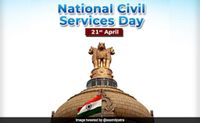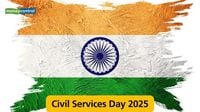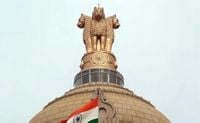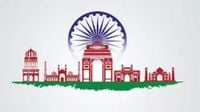National Civil Service Day is celebrated annually on April 21 to honor the dedication and contributions of civil servants in India. This year, the observance will take place on April 21, 2025, with ceremonies and awards held across the country, particularly in the capital, New Delhi. The day serves as a platform for the Prime Minister and senior officials to recognize exceptional performances by civil servants, reinforcing their vital role in the administration of the nation.
The origins of National Civil Service Day date back to April 21, 1947, when Sardar Vallabhbhai Patel, India’s first Home Minister, addressed the first batch of Indian Administrative Service (IAS) officers at Metcalfe House in New Delhi. In his iconic speech, Patel referred to civil servants as the "steel frame of India," emphasizing their crucial role in ensuring order, unity, and governance in a newly independent nation.
The objectives of this celebration are manifold. Firstly, it aims to honor and recognize the commitment and excellence of civil servants. Secondly, it seeks to motivate officers toward ethical governance and to promote best practices in public administration. Finally, it aspires to inspire the youth to view civil services as a meaningful career choice.
Charles Cornwallis, the Governor-General of India from 1786 to 1793, is often referred to as the Father of the Indian Civil Service. While the civil service system began during colonial rule, Cornwallis laid the groundwork for a professional, efficient, and accountable administration in India. His major reforms included merit-based recruitment for administrative positions, fixing salaries to reduce corruption, and implementing ethical standards for officers. These measures instilled discipline and integrity into the colonial administration, which later evolved into the modern National Civil Service in independent India.
The Indian Civil Service Act of 1861 was another pivotal moment in the evolution of civil services. This act allowed Indians to compete for administrative roles through a competitive examination system, opening the doors for Indian participation in top government posts. However, the exams were initially conducted in London, limiting access for most Indians. Over time, reforms enabled these exams to be held in India, leading to greater Indian representation in governance.
Interestingly, the concept of a civil service predates colonial India. China was the first country to introduce a formal civil service system during the Han Dynasty, around 200 BC. Their model focused on merit-based recruitment and examinations based on Confucian principles, emphasizing ethics, philosophy, and governance skills. This system eventually influenced Britain, which introduced a similar model in its colonies, including India, leading to the establishment of what we now call the National Civil Service.
To join the National Civil Service, aspirants must clear the Civil Services Examination (CSE) conducted by the Union Public Service Commission (UPSC) each year. This examination is recognized as one of the most prestigious and competitive in the country. The structure of the exam includes a preliminary exam with objective-type questions, a main exam featuring descriptive papers, and an interview (or personality test) to assess candidates' suitability for administrative roles. Successful candidates are allocated to various services, including the IAS, Indian Police Service (IPS), and Indian Foreign Service (IFS), among others.
The idea of observing National Civil Service Day was institutionalized by the Government of India in 2006. This day serves a dual purpose: it commemorates Sardar Patel’s historic speech in 1947 and recognizes administrative excellence and ethical standards. Celebrations typically include award ceremonies, where civil servants and districts are honored for innovative public service initiatives.
On April 21, 2025, the Union government will organize a day-long conference at Vigyan Bhawan in New Delhi, where Prime Minister Narendra Modi will address the nation’s bureaucrats. During this event, he will confer the Prime Minister's Awards for Excellence in Public Administration to recognize effective implementation of identified priority programs and innovations at the district and state levels. The Prime Minister will also release e-books highlighting holistic development and success stories related to these programs.
The significance of National Civil Service Day extends beyond mere recognition; it serves as a reminder of the ideals of public service in a democracy. This year’s celebration is particularly poignant as it highlights the importance of civil servants in implementing government schemes, maintaining law and order, managing public health, education, infrastructure, and sanitation, and handling crises such as natural disasters and pandemics.
Moreover, National Civil Service Day is an opportunity to reaffirm the commitment of civil servants to transparency, integrity, and service to the nation. Each year, officers are awarded for their innovative contributions to governance, which encourages the sharing and replication of best practices across states.
As the IAS association tweeted on this occasion, they will "rededicate themselves to Sardar Patel's vision of a strong, service-driven nation." This sentiment encapsulates the spirit of National Civil Service Day, as civil servants collectively strive to serve the people with integrity and commitment.
In conclusion, National Civil Service Day 2025 stands as a testament to the unwavering dedication of civil servants in shaping and developing India. It is a celebration of their hard work and a call to action for future generations to join the ranks of those who serve the nation with honor and pride.








